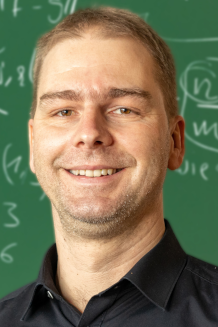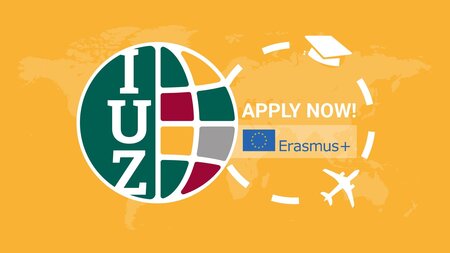Diploma in Mathematics , Dipl.-Math.
| Standard period of study: | 9 semesters |
| Start of studies: | usually with the fall term |
| Entrance requirement: | general higher education entrance qualification (Abitur, A level, high-school diploma) or subject-linked eligibility of university admission or master craftman or an equivalently approved university admission. |
| Fields of study: |
|
| Change from Bachelor/Master to Diplom: | Change from a Bachelor- or Master degree program into the Diploma curriculum is possible, credit points already obtained will be transfered. Similarly, there is the option to change from the Diploma program into a Bachelor-/Master program. Please consult academic advisors for details. |
| Language: |
|
Application
There is no admission restriction for this degree program. Application is made online.- Mathematics
- Mathematics with computer science
- Industrial mathematics
- Business mathematics
- Financial mathematics
- Chemistry
- Electrical Engineering
- Computer Science
- Mechanical Engineering
- Medical Engineering
- Physics
- Business Administration
After the foundational program various specializations in mathematics as well as in the chosen minor are offered. Within the mathematics curriculum, possible specializations include
- Algebra
- Analysis
- Discrete Mathematics
- Financial mathematics
- Geometry
- Mathematical physics
- Numerical mathematics
- Optimization
- Stochastics and Statistics
- Busines mathematics
Classes can be selected freely from the third year on, according to the student's interests. Students can get support in the choice of the specialization from academic advisors and the professors in the field of specialization where the Diploma thesis is eventually written.
Besides mathematical training, the study program also deepens the field of the technical application (Chemistry, Electrical Engineering,Computer Science, Mechanical Engineering, Medical Engineering, Physics or Business Administration).
The study program is finished with the Diploma thesis, to be written during the 9th semester of the study program.
Foundations (common to all specializations)
| 1. to 2. sem. | Analysis, Linear Algebra (32 LP) |
| 3. sem. | Mesure theory, Optimization, Complex analysis, Seminar (22 LP) |
| 4. sem. | Algebra, Numerical mathematics, Stochastic, Vector analysis (30 LP) |
| 1. to 4. sem. | Computer Science and Minor (28 LP) (chemistry, electrical engineering, mechanical engineering, medical engineering, physics or business administration) |
| 5. to 8. sem. | Memoir or Internship (8 LP) |
| 5. to 8. sem. | Seminar (4 LP) |
| 5. to 8. sem. | Specialization Pure and Applied Mathematics (84-110 LP) |
| 5. to 8. sem. | Specialization Minor (16-32 LP) |
| 9. sem. | Diploma thesis (30 LP) |
| 5. to 8. sem. | Memoir or Internship (8 LP) |
| 5. to 8. sem. | Seminar (4 LP) |
| 5. to 8. sem. | Specialization Pure and Applied Mathematics (60-76 LP) |
| 5. to 8. sem. | Specialization Computer Science (16-34 LP) |
| 5. to 8. sem. | Specialization Minor (16-34 LP) |
| 9. sem. | Diploma thesis (30 LP) |
| 5. to 8. sem. | Memoir or Internship (8 LP) |
| 5. to 8. sem. | Seminar (4 LP) |
| 5. to 8. sem. | Specialization Pure and Applied Mathematics (45-71 LP) |
| 5. to 8. sem. | Specialization Computer Science (15-25 LP) |
| 5. to 8. sem. | Specialization Minor (30-40 LP) |
| 9. sem. | Diploma thesis (30 LP) |
| 5. to 8. sem. | Memoir or Internship (8 LP) |
| 5. to 8. sem. | Seminar (4 LP) |
| 5. to 8. sem. | Specialization Pure and Applied Mathematics (especially optimization) (56-80 LP) |
| 5. to 8. sem. | Specialization Minor Business administration (46-70 LP) |
| 9. sem. | Diploma thesis (30 LP) |
| 5. to 8. sem. | Memoir or Internship (8 LP) |
| 5. to 8. sem. | Seminar (4 LP) |
| 5. to 8. sem. | Specialization Pure and Applied Mathematics (especially statistics, financial mathematics) (56-80 LP) |
| 5. to 8. sem. | Specialization Minor Business administration (46-70 LP) |
| 9. sem. | Diploma thesis (30 LP) |
Therefore, graduates of the Diploma study program find interesting employments in many fields, for example:
- information technology
- software development
- banks and insurance companies
- mechanical engineering
- simulation and optimization in machine design
- medical engineering
- pharmaceutical research
- entertainment electronics
- automobile and aerospace engineering


| Regulations and documents | Miscellaneous |
|---|---|
| Academic advisor |
|---|

Prof. Dr. Tino Ullrich
|





